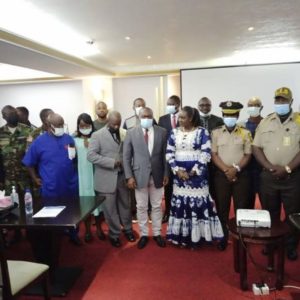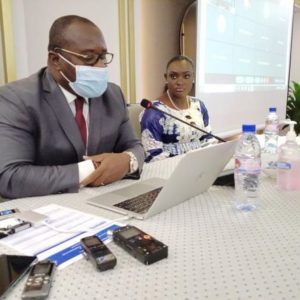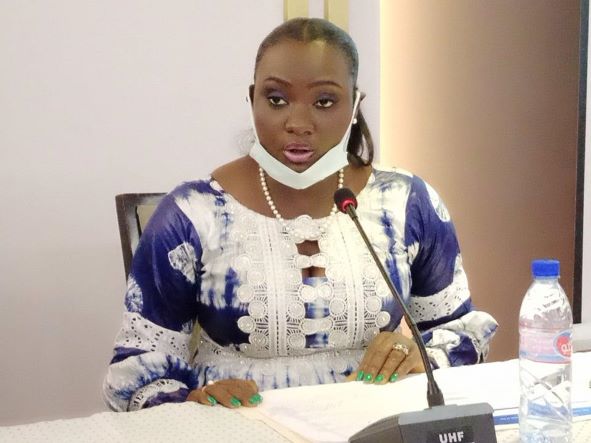PHOTO: NaFAA boss, Emma Glassco
The government of Liberia through the National Fisheries and Aquaculture Authority, NaFAA has begun a two-day technical fisheries worship in Monrovia, aimed at ending illegal fishing, says a press release from NaFAA today, Tuesday.
Discussions are focused on three treaties to ensure Port State Control, Safety and Labor Compliance at sea in Liberia.
The two-day fisheries workshop, which is jointly organized with the Fisheries Committee for the West Central Gulf of Guinea (FCWC), is taking place at the Boulevard Palace Hotel in Monrovia. It has brought together government Agencies on Fisheries, Maritime and the Environment, and regional and international Partners.

Declaring the technical fisheries workshop opened Tuesday, 21, September 2021 on behave of the government of Liberia, the Director General of the National NaFAA the partnership with stakeholders has been successful in developing national policies and management instruments and supporting data collection systems with tools and training.
She noted that success has also been recorded in helping the small-scale fisheries and indigenous peoples access resources and markets and empowering them to be part of the solution through the Collaborative Management Associations.
Additionally, Mrs. Emma Metieh Glassco indicated that NaFAA and stakeholders are “ensuring decent working conditions of all fishers, upholding fishers’ safety at sea, and a coordinated approach to increase the involvement of relevant stakeholders in the maritime domain to ensure legal catch from the net to the port”.
Director General Glassco also noted that these steps are essential in the fight against illegal, unregulated, and unreported fishing with international instruments like Port State Measure Agreement PSMA, Cape Town Agreement CTA, and the International Labour Organization ILO C188, Liberia will need a universal design to eliminate Illegal Unreported and Unregulated (IUU) Fishing.
She mentioned that NaFAA continues to work with national and international partners alike, to support Liberia’s efforts to effectively adhere to and implement the Port State Measure Agreement, Cape Town Agreement, and the ILO C188 and at the same time, NaFAA is committed to strengthening its institutional capacity and improve its monitoring, control, and surveillance systems and operations.
The Liberian Fisheries Boss moreover stressed that Transparent information exchange and digitalizing are crucial to boosting the Port State Measure Agreement, Cape Town Agreement, and C188 as Prevent should be based on early warning by sharing information. Mrs. Glassco explained that NAFAA, under its newly ‘setup’ digital initiative will play an essential role in promoting the needed technology and innovation, data sharing, and novel approaches consistent with the best standards.
Hon Glassco furthered that to facilitate information exchange among relevant stakeholders, Liberia is developing applications for designating national contact points for each treaty and with support from the World Bank, will be building a national fishing port to coordinate PSMA. At the same time she pointed out that NaFAA is now finalizing a national fisheries inspection plan and the Port State Measures Implementation Strategy which she disclosed would form party of the two days technical fisheries workshop discussion to support the PSMA, CTA, and C188.
Madam Glassco said the automation of our Monitoring Control and Surveillance (MCS) system will increase access to near real-time information exchange and increase transparency and it will also be available to all stakeholders comprising the MCS Coordination Committee, most of whom are present today.
In another development, the NaFAA Director General, Emma Glassco has emphasized that, “as we enter the Decade of Action to deliver the Sustainable Development Goals, further actions in transforming the fisheries and aquaculture sector is necessary to enhance its contribution to the SDGs. Sustainable development is vital to address the root causes of poverty and hunger”.
She said Blue transformation, intensifying sustainable aquaculture, transforming fisheries through better management, and improving the efficiency and inclusiveness of fish value chains, will be critical to ending hunger and poverty.
The Liberian Fisheries Boss indicated that “to achieve these aspirations, the fisheries sector has enormous potential it needs to be fully integrated into our efforts for better production, better nutrition, a better environment, and a better life, leaving no one behind”.
Mrs Glassco Pointed out that the world’s appetite for aquatic food shows no sign of slowing, particularly in the West Africa sub-region and the 2020 State of the World Fisheries and Aquaculture report of the FAO clearly shows the significant and growing role in providing food, nutrition, and employment globally.
She further that global fish production, for instance, has reached the highest levels ever, providing almost half the world’s population with nearly 20 percent of their average animal protein, providing a reported 80 percent of animal protein source to the local people in Liberia and today, about 10 percent of the world’s population depends on the value chain of aquatic products for livelihoods and income. As such she noted, demand should be met by more sustainable supply from aquaculture.
“With this comes the great responsibility of managing all aquatic foods sustainably and protecting our oceans, rivers, and lakes” Hon. Glassco added during the opening of the two days’ technical workshop.
She recommended that “In this regard, we need to double the efforts to manage our resources better and develop climate smart aquaculture as an essential way to take off the pressure from our oceans and seas and
Sustainable aquaculture is also a practical solution to satisfy the steady increase in demand for healthy food, promote rural development and engage the new generations”.
Speaking earlier, the Secretary General of the FCWC explained that FCWC is established to bring together Members States, join their effort to Partners to participate together actively in sustainable fisheries management in this west Africa region with key action in combatting IUU fishing and associated crimes.
Hon. Seraphin Dedi Nadji stated that “under this two days’ workshop, FCWC and the Pew Charitable Trusts (PEW) aims to inform participants on the international instruments that strengthen maritime governance at regional and national level, specifically the Food and Agriculture Organization’s Agreement on Port State Measures to Prevent, Deter and Eliminate Illegal, Unreported and Unregulated fishing (the Port State Measures Agreement, or PSMA) and the International Maritime Organization’s Cape Town Agreement (CTA)”.

(L-R) FCWC SG Nadjii and the NaFAA boss
Hon Nadji noted that “these international instruments, along with the International Labour Organization’s Work in Fishing Convention No. 188 (C188), all include requirements related to port inspections, and their harmonized application would ensure that ports represent an effective front in combating IUU fishing, to improve safety and health in the fisheries sector and labour conditions on board fishing vessels.”.

